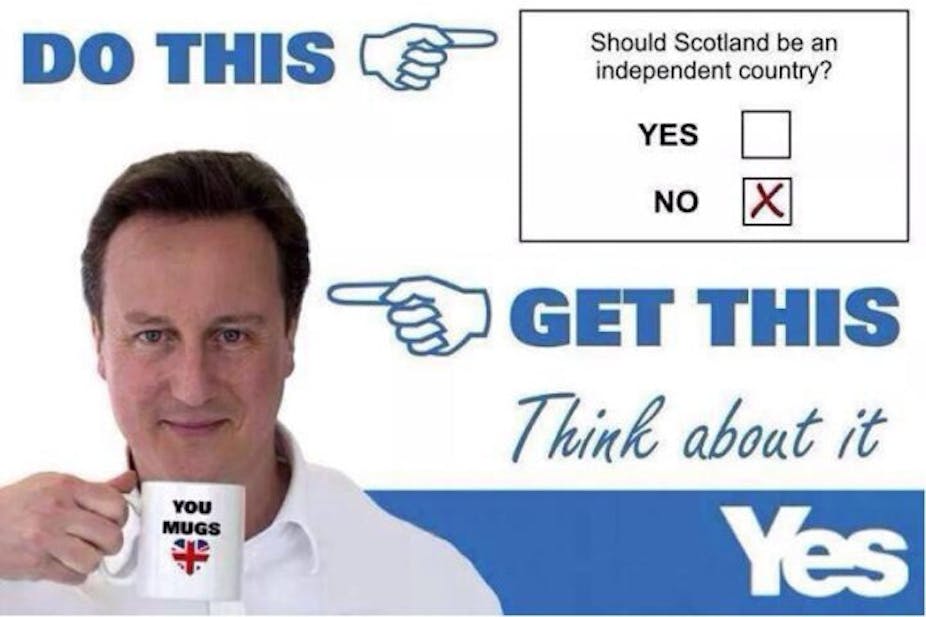As Alex Salmond and Alistair Darling went head-to-head for the last time on Monday August 25, both sides were already pre-empting the following day’s media coverage of post-match analyses, and talk of “game changers”.
But just 24 hours later, something happened which arguably generated more buzz than anything said during the TV debate: a little piece about a glaikit (not very bright) Scottish housewife dithering over the vote that was masterminded by the Saatchis and aired as a campaign broadcast for Better Together at 10pm on STV.
Only a relatively small proportion of the Scottish audience will have watched it go out, but like most things #indyref it grew its legs on social media. Overnight the hashtag #PatronisingBTlady was trending on Twitter and the ever-creative and prolific online community of yes supporters – dubbed the “cybernats” – were circulating witty and colourful variations on the original. Even some of the no voters joined in the fun. And like an uncool older relative belatedly trying to get in on the joke, the mainstream media picked up the story the next day.
More relevance in social media
Within the research and academic community, the battle rages over how much mainstream media continues to set the social media agenda – with claims that news from outlets such as the BBC and the Daily Mail are the “lifeblood” of Twitter and Facebook. Certainly the huge spikes during the TV debates give some weight to that argument.
But for many social media users the publicity around the #PatronisingBTlady simply confirmed what they already knew: that the real debate about the independence referendum, one of the liveliest and most passionate in generations, is taking place online. The public have tired of the way that Darling and Salmond – and mainstream media and politics more generally – continue to concentrate on a very narrow range of largely economic issues.
The complaint heard on the doorstep which the BT campaign broadcast at least tried to represent – is that the electorate want clarity on the questions that really matter to them, not political point scoring and soundbites.
To counter this, the electorate have gone online, directly questioning respected experts and launching their own discussions where every possible scenario, as well as every hope, dream and fear gets an airing. What independence might mean for the country’s arts and culture, for example, is rarely touched on by politicians and journalists, yet the online community have argued endlessly over questions such as what might happen to the BBC, and whether EastEnders will still be on.
Digital voices
With an average of almost 37,000 tweets circulating every day, perhaps what is most inspiring is how digital Scots have given voice to their future vision for their own country – in or out of the union – and raised fundamental questions about the values we share, what constitutes a fair society and the success or otherwise of the UK as a project.
Pro-independence blogs like Bella Caledonia have seen their readership soar doing just this, while the National Collective, a yes group representing Scotland’s artistic community, held their own “reasons day” to which thousands responded.
And this is perhaps where the “cybernats” have the edge. It’s not so easy to let the imagination and passions run wild about maintaining the status quo – even if there are strong and sensible arguments for doing so. As a result, many of those supporting a no vote have fallen back on arguments about the economic risks and, in particular, uncertainty over the currency in close parallel with the official website and mainstream media.
Research by Policy Scotland shows the Yes campaign has been less centralised, more active and spontaneous. Faced with a relatively hostile media, it has effectively exposed their inaccuracies and bias. Crucially this has also cemented the idea of the independence push as a battle against the establishment – which in the event of a yes vote might leave institutions such as the BBC not just licking their wounds but questioning their legitimacy.
At times though the debate has got ugly – the self-selection of friends and followers at the core of social media can encourage a particular kind of tribalism. Strong Yes and No supporters find it easy to immerse themselves in a media environment where they never hear anything other than an endorsement of their own views.
So when a fairly moderate statement by, say, JK Rowling is released, she is roundly dismissed by the cyber community as a “traitor”. The all-too familiar sexist and homophobic trolling is sadly part of the debate too, with both deputy first minister, Nicola Sturgeon, and Scottish Conservative leader Ruth Davidson receiving threats of violent sexual assault.
But for good or ill, passion has ultimately reigned on both sides. As to winners and losers, as one astute Twitter user observed of a TV debate, the verdict will be: “Both sides won hands down.”

